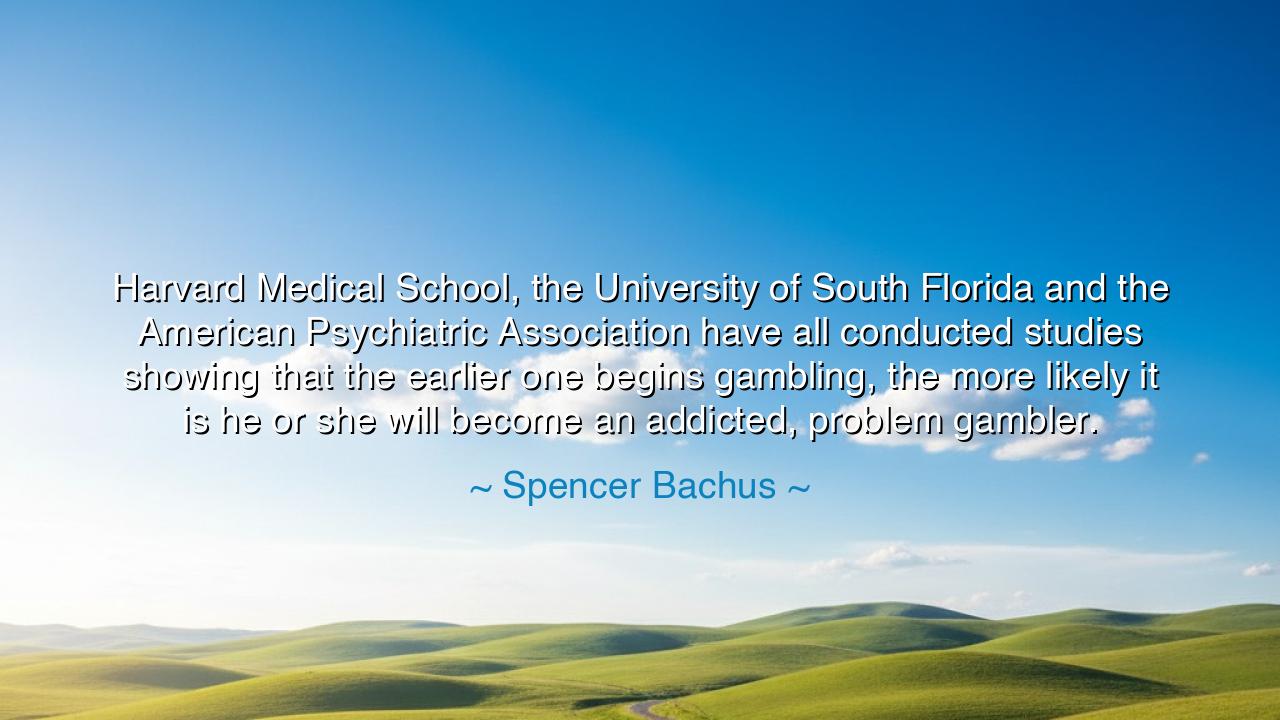
Harvard Medical School, the University of South Florida and the
Harvard Medical School, the University of South Florida and the American Psychiatric Association have all conducted studies showing that the earlier one begins gambling, the more likely it is he or she will become an addicted, problem gambler.






In the solemn words of Spencer Bachus, there lies a warning both modern and timeless: “Harvard Medical School, the University of South Florida and the American Psychiatric Association have all conducted studies showing that the earlier one begins gambling, the more likely it is he or she will become an addicted, problem gambler.” Though drawn from the language of science, these words echo with the cadence of ancient wisdom — for they speak of the frailty of human desire, of how easily the spark of curiosity can become the flame of obsession. Beneath their surface lies a moral truth as old as civilization itself: that every indulgence, when left untamed, can grow into a chain that binds the soul.
The meaning of this quote stretches far beyond the realm of gambling. It speaks to the peril of early temptation — to the danger of habits born before wisdom has ripened. For the mind, like a young tree, bends easily; the directions it takes in youth become the shape of its destiny. When one encounters the thrill of chance too early, before discipline and discernment are rooted, the heart becomes ensnared by illusion — the false belief that fortune can be seized by the spin of a wheel or the fall of a card. Thus, what begins as play becomes compulsion; what begins as leisure becomes captivity. Bachus’s words remind us that freedom, once surrendered to appetite, becomes the hardest thing to reclaim.
The origin of this quote lies in Bachus’s work as a lawmaker and moral advocate, concerned with the rising tide of gambling among the young. In his time, the world had seen a transformation — the age of digital screens and casinos made desire more accessible than ever. He turned to the wisdom of research, citing the authority of Harvard Medical School, the University of South Florida, and the American Psychiatric Association, whose studies confirmed what generations before had sensed by intuition: that early exposure to gambling plants a seed that often grows into addiction. His purpose was not merely to warn against money lost, but against dignity lost — the erosion of self-control, the descent from freedom into dependence on chance.
The ancients, too, knew the danger of surrendering to fortune. The philosopher Seneca once wrote, “No man is free who is a slave to his passions.” He was not speaking of gambling, but of all pursuits that promise pleasure while demanding the soul in return. In the forums of Rome, games of chance flourished; dice rattled in the taverns, and wagers on chariot races ruined noblemen and beggars alike. The same spirit that drives the gambler today — the thrill of risk, the hunger for the impossible — haunted the ancients. And so, they taught moderation as the highest art of living: to rule one’s desires rather than be ruled by them. In this, Bachus’s message aligns with the wisdom of centuries — that to fall too early under the sway of fortune is to forget the discipline that sustains a life of purpose.
Consider the true story of a man named Charles Wells, known in the 19th century as “The Man Who Broke the Bank at Monte Carlo.” Once, he was celebrated as a hero of luck, but his winnings, born of reckless faith in fortune, soon turned to dust. The wealth he gained vanished as swiftly as it came, and his life ended in ruin and prison. Wells was not destroyed by misfortune, but by his belief in it — by the conviction that chance was kinder than effort, that luck could replace labor. His story mirrors the fate of many: those who seek quick triumphs without wisdom are eventually conquered by the very forces they hoped to master.
The emotional power of Bachus’s warning lies in its compassion. He does not condemn those who fall into addiction; he seeks to shield the young before the snare is set. For addiction is not a crime of weakness, but a sickness of longing — a wound inflicted by the false promise of easy gain. The studies he cites are not mere numbers; they are the stories of men and women whose hopes were consumed by the slow fire of dependence. In them we see the truth that discipline is the truest freedom, and that the heart, once given to chance, finds little peace in its return.
The lesson, then, is clear and eternal: guard the gates of your desire. The earlier the heart meets temptation, the more it will mistake it for truth. Whether in gambling, pleasure, or ambition, do not trust the glittering promise of instant reward. Seek instead the steady light of patience, labor, and virtue. Parents, guide your children to wisdom before the world teaches them folly. Youths, be wary of pleasures that grow too quickly — for their roots reach deep into your freedom.
So let the words of Spencer Bachus be remembered not merely as policy, but as prophecy: that every freedom can become a chain if not tempered by self-knowledge. The gambler’s wheel is but a symbol of life itself — ever turning, ever tempting. But the wise man stands apart, knowing that chance governs the world only for those who surrender to it. To live with purpose is to refuse the tyranny of fortune, to build one’s destiny not on luck, but on virtue — and in that, to find the kind of wealth that no loss can take away.






AAdministratorAdministrator
Welcome, honored guests. Please leave a comment, we will respond soon